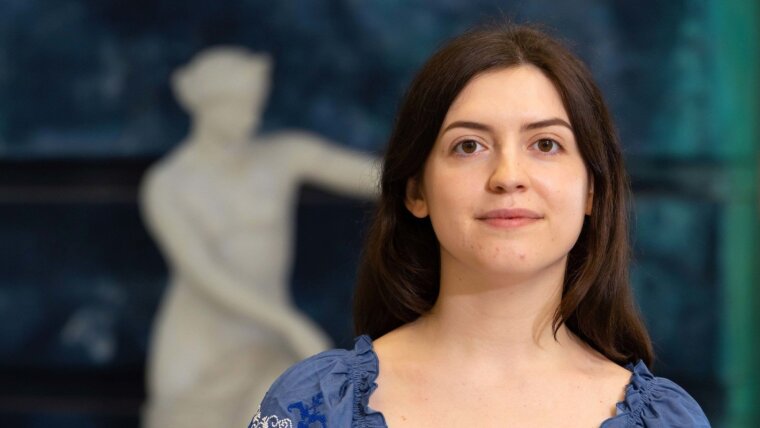
- International Affairs
- Awards and Personnel
Published: | By: Laura Weißert
For her work on behalf of refugees from Ukraine and her exceptional academic performance, the Jena student Andriiana Raikova will be awarded this year's Prize for outstanding achievements of international students studying at German universities by the German Academic Exchange Service (DAAD). The award, which is endowed with 1,000 euros, will be presented to the Ukrainian during the welcoming ceremony for new students at the University of Jena on 28 October 2022.
Andriiana Raikova has been living in Jena since October 2020. She was born in 1998 in a small town on the Sea of Azov and also attended school there before studying Applied Linguistics in Poland. "I've always liked languages," says Raikova, whose family has Bulgarian roots. In her hometown, most people speak both Ukrainian and Russian. In her studies, she then learned German as well as English.
After completing her bachelor’s degree, Raikova first worked in the IT industry for a year before deciding to do her Master's in Germany – "because I wanted to teach language and you can actually study German as a foreign language, or DaF for short, in Germany." She chose Jena because of the practical orientation of the study programme German as a Foreign Language/German as a Second Language. "Here, for example, we have practical teaching exercises and the practical module. That's not the case everywhere, and Jena is also very well known in the DaF field for that.”
Students volunteer to teach refugees
In addition to her outstanding academic achievements, it was above all Raikova's exemplary commitment that convinced the selection committee for the DAAD Prize at the University of Jena. When Russia attacked Ukraine in February 2022, there was no question for her to advocate for her home country and the people who had fled. Together with other students from her department, she organises free language courses. "Back then, my lecturer Dr Spaniel-Weise asked me what the university could do in this situation. And we as an institute also wanted to help." Thus, the idea was born to offer a German course in which Ukrainian and Russian students teach German together. Raikova used her contacts to find contributors. Eventually, about 20 volunteers from different countries offered to teach.
"Many of them had no teaching experience, so we first organised a few meetings to discuss everything," the 23-year-old recalls. The first three courses started at the beginning of April – a fourth was added a little later because the demand was much higher than expected and more students wanted to volunteer. A course is designed to last ten weeks. The participants can bridge the time until they get a place in an integration course. In July, the second cycle began with three courses.
The fact that the huge demand could be met is thanks to the many people who supported the project. "When I wrote a thank you e-mail at the end of the first cycle, I realised how many people have helped make this possible," says Raikova. "First and foremost, I am grateful to my fellow students for investing their time and effort in the courses. But the great support we received from our institute, the student council and JenDaF e. V. was also incredibly important."
Mentor for other international students
Since her youth, Andriiana Raikova has been committed to international and intercultural cooperation. In addition to helping Ukrainian refugees, she is also generally involved in supporting international students in Jena. She is a volunteer initial and subject mentor for the International Office at the University of Jena and a tutor for foreign students at the Institute for German as a Foreign and Second Language and Intercultural Studies.
"When I arrived in Jena, I also had a mentor. I think it's important to have someone at the beginning who stands at the train station and welcomes you, shows you around the city and explains how everything works." This willingness to help, Raikova says, was modelled for her by her parents. "My father always says that, if you have helped someone, the day was not wasted."
She would therefore like to use part of the prize money to invite her parents to Germany. Due to the war, this is not possible at the moment, which is why Raikova wants to save the money until her family can visit her.
In the coming winter semester, the Ukrainian will write her master’s thesis. After graduating, she had originally planned to go abroad again. "But I think I'm needed here more in the current situation." That's why she wants to stay in Germany and teach integration courses herself. And she would like to do it right here: "I feel at home in Jena."
About the DAAD Prize
The German Academic Exchange Service (Deutscher Akademischer Austauschdienst) provides the University of Jena with funding for the DAAD Prize every year. The prize can only be awarded to one person each year. In addition to above-average academic performance and special social commitment, the selection criteria for applicants include a foreign nationality and enrolment in a regular study programme at the Friedrich Schiller University Jena.